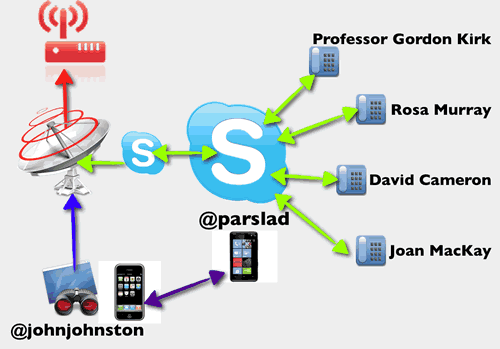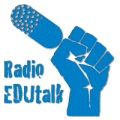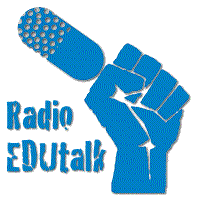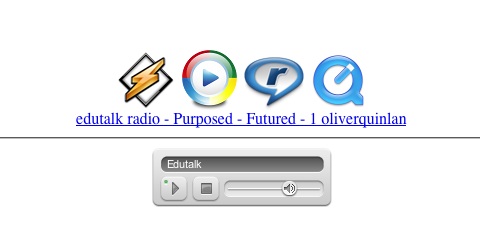I’d love to give this a go. Maybe to reboot radio edutalk
Tag: radio
Hi Jim,
When Nicecast went away I moved to Audio Hijack for the #ds106radio inspired Radio Edutalk.
It took a while to get my head round it but:
https://johnjohnston.info/blog/audio-hijack/
is a screenshot of my setting for broadcasting a skype call
As far as I remember I took only the right channel to my headphones to avoid hearing myself.
Oh and
https://apps.apple.com/gb/app/pocketstreamer/id1454181572
iOS app that I think should work with DS106 radio and is free,
Ramblings – Here Comes the Summer – Feargal Sharkey – BBC Sounds: Was a surprising show, Feargal was really enthusiastic about water quality, nature and walking.
He’s always been a rambler and is currently walking all of the river routes of London.
Radio #EDUtalk – Branching out
It was quite a busy week on Radio #EDUtalk on Tuesday David hosted Peter Doran, Chair of the Doran Review, who talked about ‘Strategic Review of Learning Provision for Children and Young People with Complex Additional Support Needs’ (Which can be listed to at: Radio #EDUtalk 6-3-12: Peter Doran). On Wednesday we hosted our most ambitious, in terms or stretching the technology, show so far: A panel discussion on ‘The professional culture of teaching’, with Professor Gordon Kirk, Academic Secretary of UCET, Rosa Murray of the General Teaching Council for Scotland (GTCS), David Cameron (independent education consultant), and Joan MacKay of Education Scotland. (Which can be listed to at:Radio #EDUtalk 8-3-12: Panel discussion on ‘the professional culture of teaching’). Later in the evening we broadcast a Trailer for Radio #EDUtalk show on 14-3-12: Professor Ian Menter.
The Panel discussion was a wee bit more complex than usual as I was working, David was at work and the 4 panellists were scattered across Scotland.
Interestingly, to me, was the fact that I was in a location where skype is blocked. So Nicecast was set up on a computer where Skype was not blocked and I connected to this one via Apple Remote Desktop.
David pulled the participants into a Skype conference via their landlines, and dialled the remote mac, I picked up the call on Skype via the remote desktop. We used our mobiles to let me know when to start Nicecast broadcasting and for any trouble shooting. David also called me at the end of the conference so that I could stop the broadcast and Radio EDUtalk went back to its Auto DJ. I was busy working with some Trainees and could not listen in.
We are having a lot off fun working with this. Internet Radio has been around for a lot longer than most of the Web 2 tools usually used by Educators an offers a lot of potential. It is inexpensive, skype is free, as this discussion was joined by land lines it cost David 5.6p per minute, whole show cost £2.80. Internet Radio Servers are inexpensive and the posterous site is free. On a mac at least the necessary software, NiceCast is easy to set up.
An invitation to Broadcast
Most of the time Radio EDUtalk is broadcasting random bits of audio from the EDUtalk archive. This is now up to 675MB, well over 200 audio files. We broadcast live regularly on a Wednesday evening but would be delighted if anyone wanted to broadcast at another time.
If you are interested in running an educational Internet Radio show of any kind please get in touch. We would be happy to run this via Skype with you or give you the opportunity to run the whole thing your self.
Radio Edutalk Progress
Since the last post (Show notes without a Show Radio Edutalk episode 2.5) we have taken a few more baby steps over at Radio Edutalk.
A week ago, I attempted a chat with Iain Hallahan over Skype. I basically started up Nicecast, and hyjacked the Skype audio. I’ve now figure out that if I just hyjack the one channel I don’t get the echo problem we had earlier. Settings Screenshot.
Iain talked about TeachMeet Beyond and kicking off TeachMeet 365. I think the chat went really well due to his enthusiasm about some facination projects, the audio is archived as an episode of Edutalk: Iain Hallahan on Radio Edutalk
Last night David and I tried a variation where we invited folk on twitter to come in over skype for a chat. Stephen Reid and Joe Dale kindly obliged talking about podcasting. We had a bit of bother getting them into a conference call via the dial in, but David pulled them in via their skype accounts. Stephen was on the move and joined in via 3g on his iPhone keeping our EDUtalk strapline, Audio publishing by educators, using mobile devices accurate. Again the audio is archived: Radio Edutalk 24 November 2011.
After we finished Joe gave us a wee hand sorting out the dial in stuff, in the future people will be able to dial in using any phone to 0131 208 1084.
Workflow
So we seem to be getting a workflow together. Last night it worked well with David figuring out the skype bit and myself the nicecast end. Due to space at home I was using my mackbook in my daughter’s bedroom rather than hooked up to the monitor in the living room, keeping Skype, it’s chat window, twitter and nicecast organised was a wee bit tricky. The week before having the living room and larger monitor made it a wee bit easier.
I am also beginning to understand some of the difficulties in handling live multi voice conversations. An increasing number of podcasts I’ve been listening to have had more than one presenter or voice. This makes, for me, interesting listening, but there is a bit of a learning curve, which I’ve just stared on, in doing this smoothly.
The audo quality seems to be pretty good, I am using a cheap usb mic, but hope to get a better one sometime soon.
So far we having been using Nicecast, but I’ve also downloaded a free application LadioCast which might do the same job, I need to do some tests and see if it can archive.
The other 167 hours
The rest of the week Radio Edutalk has been streaming random items for the Edutalk archive. I had also set up several Scheduled playlist, to play at 7:30 in the evening, unfortunately I’ve been away for a few days and didn’t tweet these out as I’d planned. I hope to try the same again over the next week and also try djing audio for he archive giving folk a chance to phone in at some point.
I’ve taken out a 500mb AutoDJ disk which hold the archive, it is already filled up. I don’t really want to pay for a bigger disk, a monthly charge, so the choice is some manual shuffling via ftp or perhaps changing bit rate from 128 to 64. The later would involve converting all of the files and getting the internet radio folk to change the settings for the stream. I am not sure how much the change would effect the quality?
Listeners
As yet we have not had a lot of listeners, but I’ve found myself listening in to the random stream more often that I thought, it makes interesting listening and can spark off all sorts of ideas.
Odds and ends
I’ve been collecting various internet links using linkli.st internet radio · linkli.st a failry new service that makes creating list of links very simple. I love the way you can create bookmarklets for any of your links screenshot.
I also use Storify to curate some tweets for last nights broadcast to include with the show notes: Radio Edutalk 20111124 · johnjohnston · Storify, Storify is easy to use and looks useful.
Next Wednesday
David and I will be talking at around 8 o’clock and the lines will be open, if you are online have a listen and if you like dial in (0131 208 1084) to put in your tuppence worth. Given the date I presume we will be talking strike along with some general eduTalk and edTechTalk.
Radio Edutalk Update
Radio Edutalk has been up and running for a week or so now. We had our first attempt at a live skype last Wednesday (archive). This was not hitch free as I messed up the settings making my audio echo, David on the other end of the Skype call and an iTunes track or two seemed fine. I think I know how to fix it.
The listener numbers have ben low with 45 unique listeners. We peeked at 6 at once. This is fine, it might build up a wee bit over time. As I mentioned in the previous radio post, it is not about numbers. The low numbers will also make it easier to keep the radio turning over 24 hours a day. The current plan is:
- A general random rotation of over 100 files from the EDUtalk archive most of the time.
- An hour of themed audio from 7:30 – 8:30 most nights (programmed by myself at the moment).
- A live hour at 8:00-9:00 on Wednesdays from David and myself, hopefully with some phone ins & scheduled guests.
- I’d also be interested in “DJing” some of the audio in some sort of theme as an alternative to the autoDJ and in the longer term we would be interested in others having a go. We are also open to adding to our pile of audio files, so if you or someone you know has some interesting audio please get in touch. I guess we could also add any suitable licensed material…
Hopefully you might find something of interest if you dip in to the stream in, perhaps as you do some marking or prep.
Radio Edutalk
Edutalk has now been running for over 2 years, we have published over 300 pieces of educational audio. These vary from TeachMeet recording, through to personal reflection by way of pupil podcasts. Hopefully theses provide interesting and educational listens.
One of the things that David and I talked about when we started EDUtalk was issuing a CD rom of recordings, this would perhaps have helped to keep older, still valuable, audio playing.
One of my thoughts about podcasts is that older episodes get forgotten about in a way that old blogs posts, through searching, do not.
REcently I’ve been reading about and listening to ds106 Radio and Stephen’s Downes’ Ed Radio. These are Internet radio stations. My interest was also stimulated by my daughter who is currently doing some pro bono work for Airing Pain « Pain Concern a podcast and internet radio.
I’ve alway believed (and gone on about) one of the benefits of podcasting over radio is its asynchronously. The potential audience for internet radio would seem to be less. A few things have made me think again:
A comment on Stephen Downes – Google+ about ED Radio:
That's the intent of Ed Radio, it's not something you really focus on, it's more background where you listen while you work & where something may or may not catch your attention.
Somewhere else, Stephen wrote about the interesting challenge of broadcasting to no listeners. Can’t find the quote at the moment.
on broadcasting to radio #ds106 | D’Arcy Norman dot net
How does the ability to instantly broadcast live audio to a group of people impact what we do? How does this instant synchronous connection effect the sense of social presence? And how does having to make the decision of streaming vs. recording effect the experience of sharing?
I’ve also been impressed by the quality of internet radio when streaming to a phone on g3 as well as wifi. So we though we would give this a go
How to
There are various posts on the how to set up a station but I basically went to Internet Radio Servers and set up an Icecast server on pay as you go. I then followed CogDog Guide to Nicecasting – CogDogBlog to test Nicecast. You can use Nicecast to broadcast from iTunes or a mix of iTunes and voice or even iTunes, voice and Skype. You can use Nicecast for an hour at a time for free and pay when you have tested it. I am using it on test mode at the moment. I have also tested the AutoDJ set up, where the station just streams from a set of mp3 you have uploaded via ftp. this seems to works well. Instructions on Internet Radio Servers are straightforward.
I’ve briefly tested Papaya Broadcaster a £2.99 iPhone & iPad app this seem to do the trick. allowing you to broadcast on the move.
A Plan
The costs at the moment £5 a month to host the AutoDJ files and £5 per 10GB broadcast. I am figuring with only a few listeners it will only be £10 a month to broadcast for an hour or so each night, using a variety of sources.
We have a few loose ideas of what to broadcast:
- Broadcasting sets of audio from the Edutalk Archive on AutoDJ 7:30 to 8:30 each night. The hope is that folk will have it on in the background listening for serendipitous educational audio. I’ve not really worked out the queuing of the audio but will select some and mix then up every day or two. So far I’ve downloaded and converted to the correct samplerate & bitrate over 60 files.
- Once a week on Wednesdays David and I will attempt some sort of skpye in show where folk can skype in for a chat, we still have to test this. This can be recorded and fed back into Edutalk as a podcast.
- Curated sets from the Archive, using nicecast and iTunes, possibly opening it up to guest hosts.
- Live event broadcasts, for example from a TeachMeet using Papaya Broadcaster.
- Anything else we can dream up or is suggested…
Tech Tips (for geeky teachers)
It seems that you need to use files that all have the same sample rate, bitrate and number of channels. I’ve started off with 60-70 files downloaded from Edutalk , the problem is these do not all have the same sample rate, bitrate and number of channels This can be dome by opening and exporting the files from Audacity, or exporting them from iTunes. This could take quite a while. A quick google found a script for the Lame lib (That is used by Audacity to export mp3s), You need to instal Lame so that it is available for command line use, this sort of stuff can be daunting but worth it as a time saver.
What I did was open the Terminal, navigate to the folder full of mp3s (on a mac you can type cd and then drag a folder onto the terminal window), then you just put this int othe terminal window and hit return:
mkdir save && for f in *.mp3; do lame -m m -b 128 –resample 44.1 "$f" ./save/"${f%.mp3}.mp3"; done
What that does is make a new folder save inside the mp3 folder, then use lame to convert all the mp3s in the folder into new files in the save folder that all have a bitrate of 128, a sample rate of 44.12 and are mono files. Well worth doing if only to avoid having to see asave dialog 60 times.
How to listen
between 7:30 and 8:30 head over to Radio Edutalk – EDUtalk. A flash player should start when the page opens. There are also buttons to listen with winamp, Windows Media player, Real player or QuickTime. Hit the title song to open in iTunes.
I’d love to hear what folk think, ideas for broadcasts or cc licensed audio that could be played.




